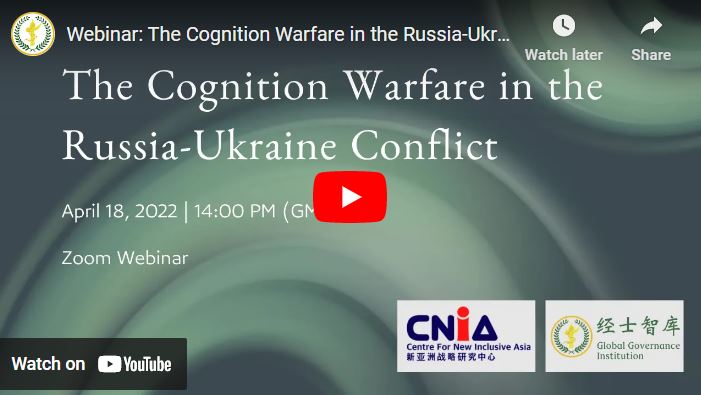The Cognition Warfare in the Russia-Ukraine Conflict

Webinar: The Cognition Warfare in the Russia-Ukraine Conflict
18th of April 2022 | 14:00 – 17:00 (GMT+8) | Zoom
Speaker Introduction
Andrew Korybko is American Moscow-based political analyst specializing in the relationship between the US strategy in Afro-Eurasia, China’s One Belt One Road global vision of New Silk Road connectivity, and Hybrid Warfare. He is a member of the expert council for the Institute of Strategic Studies and Predictions at the People’s Friendship University of Russia.
Background
New technologies are increasingly being used in the cognition domain. Since the Russian-Ukrainian crisis broke out in 2014, a ‘cognition war’, using various kinds of information as weapons, has already been waged between the two countries in warlike emergencies and armed conflicts. This cognition warfare has moved well past the initial stage and continues apace.
‘Cognition warfare’ has long been waged through traditional media and parties involved, and is usually between two hostile/belligerent states. Its persuasive and social engineering roles as persuasion and social engineering applied to altering military tactics were not very prominent.
As far as this Russia-Ukraine conflict is concerned, amidst the deluge of authentic reports, there has been a spate of misleading news and false information related to the conflict that has flooded traditional and social media.
Issues to be Discussed
The discussion will cover, but not be limited to, the following specific issues:
1. What does ‘cognition war’ mean in general? How is it being played out in the current Russia-Ukraine conflict?
2. Who are the participants in the ‘cognition war’. What are their practices and objectives? What roles do they play in influencing the perceptions of the Russia-Ukraine conflict? How do they help shape the political legitimacy of the conflicting parties?
3. How does the ‘cognition war’ affect the attitude of different sovereignty states and state actors on the Russia-Ukraine conflict? In what ways has this influence been achieved?
4. ‘Cognition war’ has been observed in military operations led by US and NATO troops in the past, such as those against the former Taliban regime in Afghanistan and Saddam’s regime in Iraq. However, ‘cognition war’ in those cases did not seem to play as significant a role as it does in the Russia-Ukraine crisis. Why is that so? And to what extent can it be attributed to the rise of social media over the past decade?
5. How would ‘cognition war’ influence or shape the discourse on international law and order? Given that, ONLY for the exceptional scenario of the Russia-Ukraine conflict, the NATO narratives have broken many fundamental principles of international human rights law they have upheld as rules of the road, for instance, the freedom of expression, the protection of personal property, and non-discrimination. In what ways would it pose challenges to the existing norms and orders of international law?
6. What are the short- and long-term impacts of ‘cognition war” on the outcome of the conflict? Given the advantages Ukraine and the Western countries have in the ‘cognition war’ in comparison with Russia, how will the west continue to dominate or monopolize the ‘cognition war’ through the dissemination of information/disinformation according to their narrative? Given the West have a monopoly on social media platforms such as Twitter and Facebook, how shall the developing countries respond to that in the future conflict with the West?
Organizers
Global Governance Institution (GGI),
The war propaganda changes its shape
China Center for New Inclusive Asia (CNIA), Malaysia
 TheAltWorld
TheAltWorld 
0 thoughts on “The Cognition Warfare in the Russia-Ukraine Conflict”